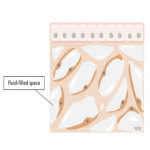Definition
noun, plural: fixations
(biological technique) The use of a fixative to preserve histological, cytological, or microbiological specimen
(zoology) The determination of type, whether by designation, or indication
(chemistry) The process in which a substance is removed from the gaseous or solution phase and localized, as in carbon dioxide fixation; The chemical removal of all undeveloped salts of the film emulsion, leaving only the developed silver forming a permanent image
(ophthalmology) The direction of the gaze so that the visual image of the object falls on the fovea centralis
(orthopedics) The act of holding, suturing, or fastening in a fixed position
(psychiatry) The arrest of development at a particular stage
(psychology) A close and suffocating attachment to another person, such as a childhood figure like one’s mother or father
Supplement
Word origin: Old French fixation
Related term(s):
- Abiotic Fixation
- Ammonia fixation
- C3 carbon fixation pathway
- C4 carbon fixation pathway
- Carbon fixation
- Circummandibular fixation
- Complement fixation test
- Craniofacial fixation
- Eccentric fixation
- Elastic band fixation
- Field of fixation
- Fixation disparity
- Fixation nystagmus
- Fixation ocular
- Fixation reaction
- Fracture fixation
- Fracture fixation internal
- Jaw fixation techniques
- Latex fixation test
- Latex fixation tests
- Line of fixation
- Nitrogen fixation
- Point of fixation
- Tissue fixation

